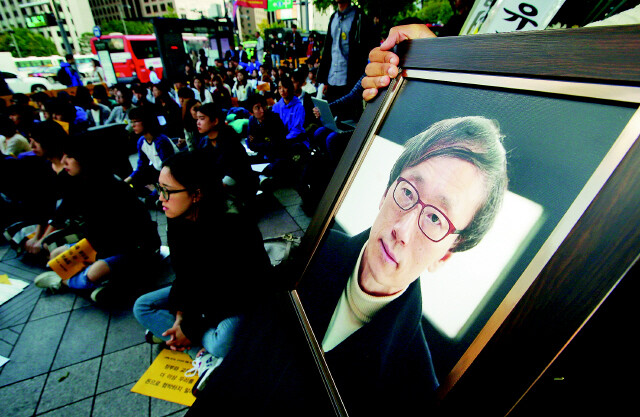hankyoreh
Links to other country sites 다른 나라 사이트 링크
Under Pres. Park, “A full-scale destruction of higher education”

“There’s no education in universities. We can’t harness any critical opinions, and so there’s just this wraithlike defeatism. It’s an embarrassment.”
This harsh assessment of the South Korean educational system was delivered by a professor at one of the country’s national universities, who claims that educational democracy has “withered” as a result of Ministry of Education pressures undermining the roles of everyone from schoolteachers to professors - and even university presidents - since the Park Geun-hye administration took office.
“A full-scale destruction of higher education has been taking place under the Park administration,” said Roh Joong-kee, a professor of sociology at Hanshin University.
One of the ministry’s moves has been a decision to reduce university enrollment numbers by 160,000 students through 2022, with a list of “underperforming universities” published last August. Whereas Park’s predecessors under the Lee Myung-bak administration (2008-13) had merely used financial support as a way of pressuring universities into restructuring, the current administration appears to be adopting more coercive methods with its outlining of specific reduction targets.
“As bureaucratic pressures combined with control of corporations by business, we’re seeing an extremely destructive form of restructuring under way on campuses,” Roh claimed.
“We can expect some serious conflict and difficulties at universities if they carried out a second round of restructuring during the remainder of Park’s term,” he predicted.
Results published in the professors‘ newspaper Kyosu Shinmun last month from a survey of 1,180 university professors showed 65.3% of respondents agreeing that the ministry’s assessment of university structural reforms had not been conducted fairly. 92.5% agreed that reforms to the ministry itself should take precedence over university structural reforms - a signal of the academic community‘s simmering distrust for the administration.
Faculty members on the ground who object to the administration’s more high-handed approach to administration end up either excluded or cowed into silence. In Oct. 2013, the administration sent notice to the Korean Teachers’ and Education Workers’ Union (KTU) that it was no longer considered a union in legal terms. On Dec. 15, an amendment to the appointment system for presidents at national universities did away with direct election. Professors who took part in statements in response to last year’s Sewol ferry sinking and this year’s decision to designate official state-issued history textbooks ended up faced with disciplinary action - or even criminal prosecution. The ruling Saenuri Party (NFP) has availed itself of every opportunity to call for an end to direct election of education superintendents. The attacks on the KTU and direct elections of university presidents and education superintendents are a repudiation of some of the major achievements of South Korean democratization.
“The spirit of the constitution is that universities should operate autonomously, yet the attitude of professors and students themselves is that national universities aren’t allowed to do anything by themselves,” said Kim Il-gon, head of the policy office for the National and Public University Union.
“Somewhere along the way, they turned into sub-institutions of the Ministry of Education,” Kim said.
KTU spokesperson Song Jae-hyeok said the administration was “treating KTU, the country’s single-biggest teachers’ union, as enemies and shutting us out.”
“Not only that, but any kind of critical opinions have been shut out and educational discussions have been nonexistent in the amendment of the curriculum, including the state history textbook issuance matter,” Song added. “Instead, the curriculum has just been restructured to suit the administration’s tastes.”
By Um Ji-won, staff reporter
Please direct questions or comments to [english@hani.co.kr]
Editorial・opinion
![[Column] Park Geun-hye déjà vu in Yoon Suk-yeol [Column] Park Geun-hye déjà vu in Yoon Suk-yeol](https://flexible.img.hani.co.kr/flexible/normal/500/300/imgdb/original/2024/0424/651713945113788.jpg) [Column] Park Geun-hye déjà vu in Yoon Suk-yeol
[Column] Park Geun-hye déjà vu in Yoon Suk-yeol![[Editorial] New weight of N. Korea’s nuclear threats makes dialogue all the more urgent [Editorial] New weight of N. Korea’s nuclear threats makes dialogue all the more urgent](https://flexible.img.hani.co.kr/flexible/normal/500/300/imgdb/original/2024/0424/7317139454662664.jpg) [Editorial] New weight of N. Korea’s nuclear threats makes dialogue all the more urgent
[Editorial] New weight of N. Korea’s nuclear threats makes dialogue all the more urgent- [Guest essay] The real reason Korea’s new right wants to dub Rhee a founding father
- [Column] ‘Choson’: Is it time we start referring to N. Korea in its own terms?
- [Editorial] Japan’s rewriting of history with Korea has gone too far
- [Column] The president’s questionable capacity for dialogue
- [Column] Are chaebol firms just pizza pies for families to divvy up as they please?
- [Column] Has Korea, too, crossed the Rubicon on China?
- [Correspondent’s column] In Japan’s alliance with US, echoes of its past alliances with UK
- [Editorial] Does Yoon think the Korean public is wrong?
Most viewed articles
- 1‘We must say no’: Seoul defense chief on Korean, USFK involvement in hypothetical Taiwan crisis
- 2[Reportage] On US campuses, student risk arrest as they call for divestment from Israel
- 3[Column] Park Geun-hye déjà vu in Yoon Suk-yeol
- 4‘Weddingflation’ breaks the bank for Korean couples-to-be
- 5Korea sees more deaths than births for 52nd consecutive month in February
- 6N. Korean delegation’s trip to Iran shows how Pyongyang is leveraging ties with Moscow
- 7Amnesty notes ‘erosion’ of freedom of expression in Korea in annual human rights report
- 8Will NewJeans end up collateral damage in internal feud at K-pop juggernaut Hybe?
- 9N. Korean hackers breached 10 defense contractors in South for months, police say
- 10[Guest essay] The real reason Korea’s new right wants to dub Rhee a founding father